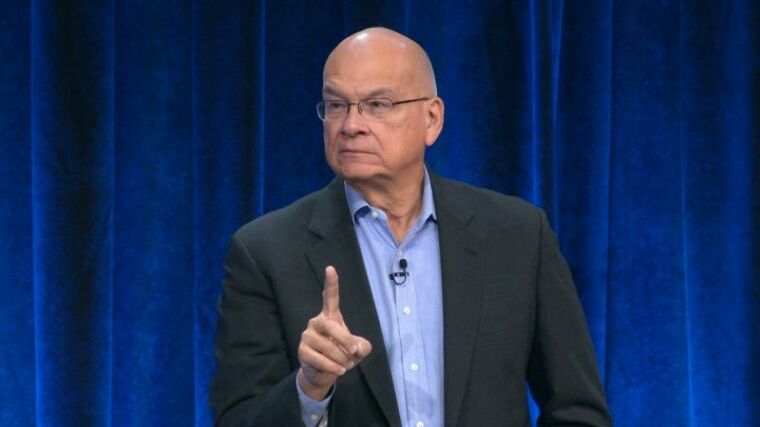Tim Keller warns against divisions in the Church for the sake of politics
Timothy Keller, senior pastor at Redeemer Presbyterian Church in New York City, spoke about the challenges that Christians face in evangelizing to the post-Christian culture and warned against the division of the Church for the sake of politics.

Keller delivered his message on Thursday, the last day of the Movement Day Global Cities conference at the Jacob Javits Center in New York. He expressed his concern that Christians might be caught up in the political fragmentation that is happening across the world.
"We might start getting divided politically instead of remembering that you're Christian first and you're white, black, Asian, Hispanic, second. You're a Christian first and you're American, or you're British and you're African second," he said.
The pastor acknowledged that there are growing challenges in evangelizing to the post-Christian culture. He perceived that secularism and individualism, which were once believed to be confined to the West, are now spreading globally.
"The reason why it presents a particular problem for evangelism is because this is the first non-Christian culture that is based on the rejection of Christianity," he said.
The pastor noted that churches are having difficulties with navigating the post-Christian culture and will continue to do so until they find better ways to move forward.
He urged Christians to pursue righteousness instead of blessedness. He said that aiming for righteousness would lead to blessings.
Keller saw the excessive use of social media and technological devices as another challenge to the church.
"The shaping and forming impact of social media, for example, is far, far greater than television ever was. Churches have got their kids a couple hours a week if they're lucky, and therefore we have not figured out how to form Christians in the culture," the pastor warned.
Keller is still optimistic despite the challenges, adding that Christianity is spreading across the world. He highlighted the importance of evangelizing in cities and encouraged the formation of multi-ethnic leadership in churches.
 Christians don't have to affirm transgenderism, but they can’t express that view at work: tribunal
Christians don't have to affirm transgenderism, but they can’t express that view at work: tribunal Archaeology discovery: Medieval Christian prayer beads found on Holy Island
Archaeology discovery: Medieval Christian prayer beads found on Holy Island Presbyterian Church in America votes to leave National Association of Evangelicals
Presbyterian Church in America votes to leave National Association of Evangelicals Over 50 killed in 'vile and satanic' attack at Nigerian church on Pentecost Sunday
Over 50 killed in 'vile and satanic' attack at Nigerian church on Pentecost Sunday Ukrainian Orthodox Church severs ties with Moscow over Patriarch Kirill's support for Putin's war
Ukrainian Orthodox Church severs ties with Moscow over Patriarch Kirill's support for Putin's war Islamic State kills 20 Nigerian Christians as revenge for US airstrike
Islamic State kills 20 Nigerian Christians as revenge for US airstrike Man who served 33 years in prison for murder leads inmates to Christ
Man who served 33 years in prison for murder leads inmates to Christ


 Nigerian student beaten to death, body burned over ‘blasphemous’ WhatsApp message
Nigerian student beaten to death, body burned over ‘blasphemous’ WhatsApp message 'A new low': World reacts after Hong Kong arrests 90-year-old Cardinal Joseph Zen
'A new low': World reacts after Hong Kong arrests 90-year-old Cardinal Joseph Zen Iran sentences Christian man to 10 years in prison for hosting house church worship gathering
Iran sentences Christian man to 10 years in prison for hosting house church worship gathering French Guyana: Pastor shot dead, church set on fire after meeting delegation of Evangelicals
French Guyana: Pastor shot dead, church set on fire after meeting delegation of Evangelicals ‘Talking Jesus’ report finds only 6% of UK adults identify as practicing Christians
‘Talking Jesus’ report finds only 6% of UK adults identify as practicing Christians Mission Eurasia ministry center blown up in Ukraine, hundreds of Bibles destroyed: 'God will provide'
Mission Eurasia ministry center blown up in Ukraine, hundreds of Bibles destroyed: 'God will provide' Church holds service for first time after ISIS desecrated it 8 years ago
Church holds service for first time after ISIS desecrated it 8 years ago Burger King apologizes for 'offensive campaign' using Jesus' words at the Last Supper
Burger King apologizes for 'offensive campaign' using Jesus' words at the Last Supper Uganda: Muslims abduct teacher, burn him inside mosque for praying in Christ’s name
Uganda: Muslims abduct teacher, burn him inside mosque for praying in Christ’s name